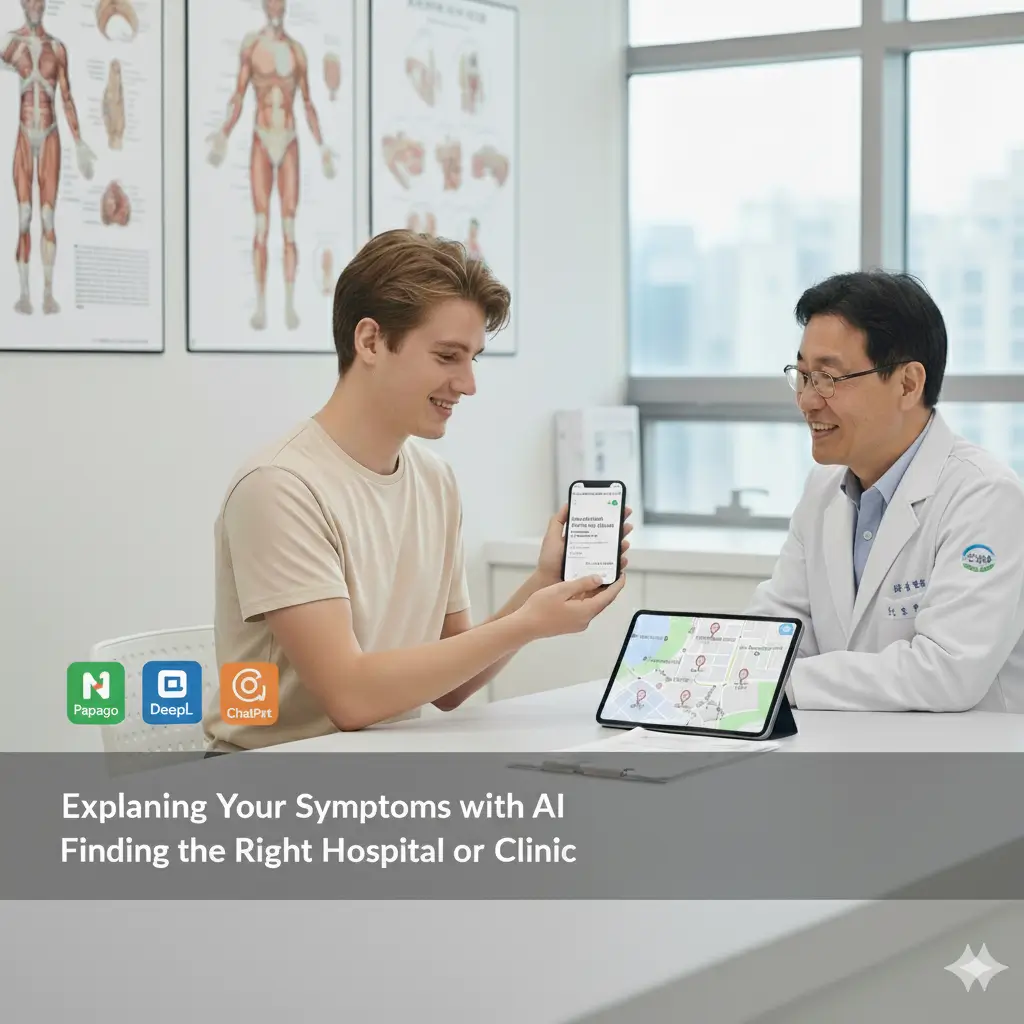Introduction
If you’re a foreign teacher in Korea, you’ll quickly learn that healthcare here is high‑quality, affordable, and efficient. But there’s one big challenge: language and system barriers. From explaining your symptoms to finding the right hospital, even simple visits can feel overwhelming.
The good news? AI apps can be your personal healthcare assistant. With the right tools, you can translate symptoms, locate English‑friendly clinics, and even manage prescriptions—all from your phone.
1. Explaining Your Symptoms with AI
Doctors in Korea are skilled, but not all speak English. AI translation apps bridge the gap:
- Papago (https://papago.naver.com/) – Korea’s most trusted AI translator. Type or speak your symptoms and show the Korean text to your doctor.
- DeepL (https://www.deepl.com/translator) – Great for longer explanations like “I’ve had stomach pain for three days.”
- ChatGPT (https://chat.openai.com/) – Ask: “How do I say ‘I feel dizzy and nauseous’ in Korean for a doctor?” Copy and paste the result.
Pro Tip: Write your symptoms in English, translate them, and print or save them on your phone before your appointment.
2. Finding the Right Hospital or Clinic
Korea has a tiered healthcare system: small clinics, general hospitals, and university hospitals. To find the right one:
- Naver Map (https://map.naver.com/) – Search “hospital” or “clinic” and check reviews. Look for mentions of “English service.”
- KakaoMap (https://map.kakao.com/) – Easy to use, with AI‑powered directions.
- Google Maps (https://maps.google.com/) – Helpful for expat reviews, though less detailed than Korean apps.
Look for: “International Clinic” or “Foreigner Friendly” in reviews.
3. At the Pharmacy
Pharmacies in Korea are everywhere, but medicine names differ from back home. AI can help:
- Papago Camera Mode – Point your phone at prescriptions or labels for instant translation.
- Drugs.com Interaction Checker (https://www.drugs.com/drug_interactions.html) – Check if your new medicine is safe with others you’re taking.
- Medisafe (https://www.medisafeapp.com/) – AI pill reminder app so you never miss a dose.
Pro Tip: Always check the active ingredient with AI, not just the brand name.
4. Emergency Situations
Emergencies are stressful, but AI can help you prepare:
- Save these phrases:
“I need an ambulance” → 구급차가 필요해요 (gu‑geup‑cha ga pil‑yo‑hae‑yo)
“I have chest pain” → 가슴이 아파요 (ga‑seum‑i a‑pa‑yo) - 119 Emergency Call – Korea’s emergency number. Some centers are testing AI translation, but speak slowly.
- Naver Map – Quickly routes you to the nearest ER or 24‑hour pharmacy.
5. Bonus: Health Tracking
Stay proactive with AI health apps:
- Samsung Health (https://www.samsung.com/global/galaxy/apps/samsung-health/) – Tracks steps, heart rate, and integrates with Korean hospitals.
- Apple Health (https://www.apple.com/ios/health/) – AI‑powered health insights for iPhone/Apple Watch users.
Quick Checklist
- Download Papago + Naver Map before you arrive.
- Prepare an AI‑translated symptom sheet for doctor visits.
- Use camera translation at pharmacies.
- Save emergency phrases in your phone.
Conclusion
Healthcare in Korea doesn’t have to be intimidating. With AI apps, you can:
- Communicate clearly with doctors
- Find the right hospital or pharmacy
- Manage prescriptions safely
- Stay prepared for emergencies
Think of AI as your digital healthcare co‑pilot—always ready to translate, guide, and support you.

